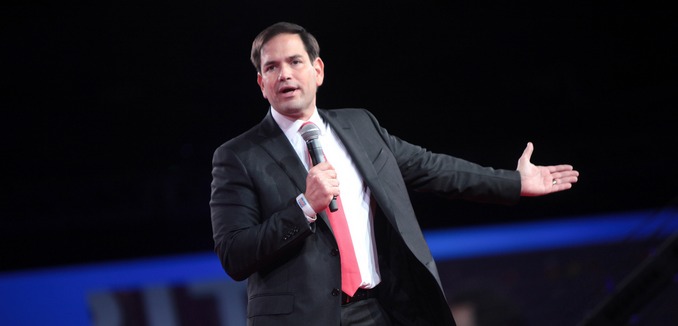Republican presidential contender Sen. Marco Rubio (R – Fla.) strongly criticized the European Union’s new guidelines on labeling Israeli goods manufactured in territories beyond the 1949 armistice lines, saying that doing so would “politicize international trade, undermine economic cooperation between Israelis and Palestinians, and reward Palestinians who reject peace with Israel.”
In an op-ed in National Review, Rubio emphasized the discriminatory nature of the guidelines, observing that out of “more than 200 disputed territories worldwide,” only Israel is singled out and targeted by the EU. He charged that the policy would “encourage Europeans to boycott Israeli products, and to stoke European animosity toward Israel — which is already at disturbingly high levels.”
The rule is grossly unjust. It makes a mockery of the EU’s claimed commitment to international law. It punishes Israel for Palestinian leaders’ repeated rejection of statehood offers and for their ongoing refusal to negotiate. In the midst of a new wave of Palestinian terror, the EU seeks to punish Israel while taking no action against Palestinians inciting and perpetrating murder. The rule requires products sold in Europe and produced in what the EU considers ‘Israeli-occupied territories’ to be specially labeled.
To illustrate the absurdity of this policy, produce grown in the hills outside Jerusalem will be specially labeled, but not produce grown in Gaza, which is controlled by a U.S.- and EU-designated terrorist organization. Remarkably, the EU’s labels will even apply to the Golan Heights, captured from Syria in a defensive war in 1967.
And while the EU is rewarding Palestinians who refuse to make peace, the Palestinians who will face the most harm from the labeling rule are those who work cooperatively with Israelis. One of the only lasting achievements of the peace process is the creation of a single economic unit, including a customs union, of Israeli and Palestinian Authority–controlled areas. This free trade and economic cooperation improves lives and gives Palestinians a stake in maintaining peace — but the EU will now deliberately punish this cooperation, and the people who will be hurt the most are Palestinian workers, not Israelis.
The senator said that the guidelines would be a means “to single out Israel for discrimination,” and called on future American administrations to “vigorously oppose it through legal challenges to this politically motivated barrier to trade.”
Rubio was one of 36 senators who signed a bipartisan letter on Monday arguing that the guidelines would “promote a de-facto boycott of Israel.”
Rubio’s statements were echoed by David Simha, president of the Israeli-Palestinian Chamber of Commerce and Industry, who said in a conference call with reporters on Wednesday that the labeling policy jeopardized the livelihoods of thousands of Palestinians employed by Israeli businesses in the West Bank, who would be laid off if the companies suffer a significant loss in revenue. Simha also explained that goods produced in such businesses only constitute roughly 0.1 percent of Israeli exports, and that the EU’s policy would therefore not have a tangible effect on the Israeli economy.
[Photo: Gage Skidmore / Flickr ]




